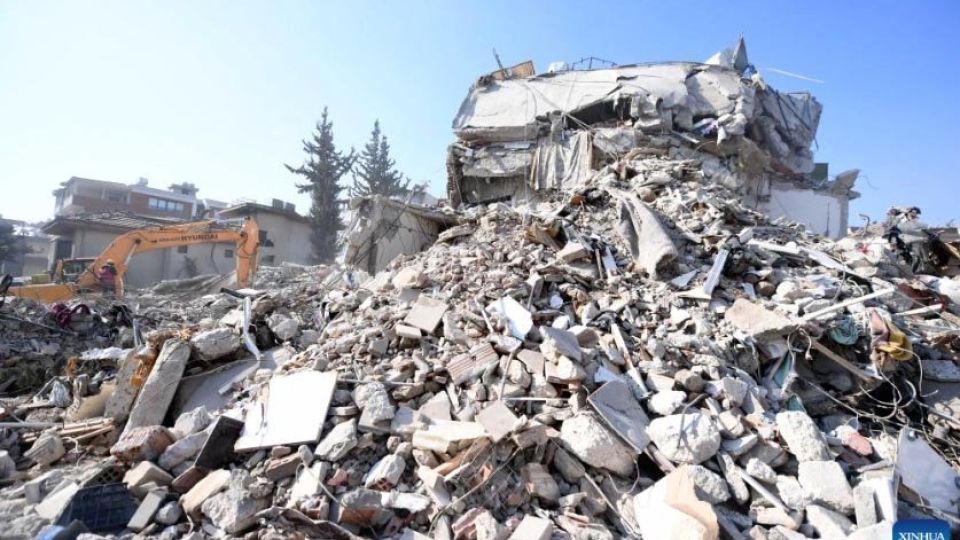
BEIJING – The earthquake that hit Turkiye and Syria on Feb 6 was one of the deadliest in the two nations’ history. Apart from claiming more than 37,000 lives and leaving many others injured, which should be deeply mournful, the earthquake is also likely to affect the world economy by causing changes in logistics and transportation, even if it doesn’t affect global output.
Syria has a tiny share in the world economy due to Western sanctions. Even Turkiye, an economic powerhouse in the Middle East which has significant comparative advantages due to its economic size and industrial structure, does not have much weight in the global economy.
Turkiye’s GDP in 2022 was $853.5 billion, accounting for only 0.84 percent of the global total. As such, the Feb 6 quake, despite being devastating, will not have a noticeable impact on global economic output, although the global markets will take into consideration the risks massive earthquakes have on Turkiye’s economy. For example, a number of major infrastructure projects that have been built or are in the pipeline in Turkiye might be devalued, and the investment and construction costs will rise significantly.
Located between Europe, the world’s largest energy importer and consumption market, and the Middle East and Central Asia-Caspian Sea, two oil and gas energy-rich areas, Turkiye is a global energy transportation hub.
On the other hand, Russia has been trying for years to export oil and gas to Europe bypassing Ukraine, while Central Asian countries and Azerbaijan plan to open new oil and gas export routes, especially to Europe. On their part, the European Union and the United States plan to open the Central Asia-Caspian Sea oil and gas pipeline to weaken Russia’s control over oil and gas supplies in the region, and Iran is keen on opening oil and gas supply channels to Europe circumventing the Strait of Hormuz and the Suez Canal.
All these will require building oil and gas pipelines through Turkiye.
Since the start of the Russia-Ukraine conflict, which was immediately followed by Western sanctions against Moscow, Russian oil and gas supplies via land-based pipelines passing through Ukraine and Poland were greatly restricted, and could be completely stopped in the near future. And since the Nord Stream natural gas pipeline has been bombed, Russia urgently needs to expand its oil and gas export routes.
Furthermore, Azerbaijan, Turkmenistan, Kazakhstan and Uzbekistan need to open new oil and gas export channels beyond the Russian pipeline network, because these former Soviet republics want to expand their energy supply channels.
Theoretically speaking, they have four possible routes to expand their supply channels: China, Turkiye, Iran, and Afghanistan-Pakistan-India.
However, Iran has been reeling under the impact of Western sanctions, and could face new sanctions. And no pipeline passes through Afghanistan, Pakistan and India, as the risks of such an arrangement are too high. The only realistic options therefore are China and Turkiye.
While a pipeline through Turkiye can facilitate the flow of oil and gas to Europe and its neighboring markets, extending across the oceans to the US, South Asia and East Asia, the Chinese channel can supply to China, East Asia and the neighboring markets in Southeast Asia and beyond.
Several oil and gas pipelines from Central Asia to China have been in operation for more than 10 years. With the US, Iran and the Taliban regime in Afghanistan caught in a stalemate over oil and gas supply channels, the most realistic choice for the West would be to help extend the Central Asia-Caspian Sea oil and gas route through Turkiye, a NATO member, and reduce or even stop the supply of China-Central Asia oil and gas pipelines.
However, the fact that Ceyhan, Turkiye’s most important oil and gas transportation hub, is not far from the epicenter will weaken Turkiye’s position as an international oil and gas transportation hub. This in turn may push Russia and Central Asia-Caspian Sea countries to export their oil and gas resources eastward through China, and force Europe to rely more on North and West Africa to replace more Russian oil and gas.
This mid- to long-term change in the source of oil and gas imports in Europe may indirectly provide financial support for Islamic fundamentalists to expand their terrorist and separatist activities in North and West Africa and beyond, intensifying religious, tribal and national conflicts in the region.
The European countries may have to weigh the pros and cons of their policies.
Source: https://asianews.network/
